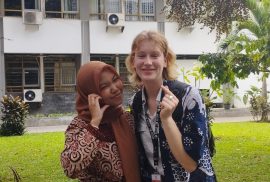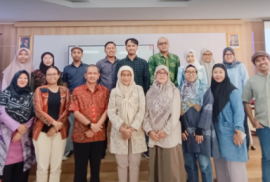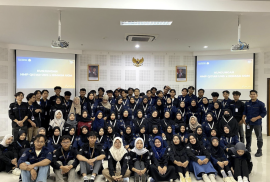Amid the surge of technology and the rise of artificial intelligence capable of arranging sentences neatly, Kumala–student of Arabic Literature–chose writing as her path of expression and contribution. “AI-generated writing may be neat, but the emotion and meaning can only come from humans,” she said.
For Kumala, being a student of Arabic Literature is not just about reading classical works or understanding the Arabic language in depth, but also about learning how to voice stories powerfully. Content writing became the medium she chose to bridge theory with practice. She believes that good writing can serve as a bridge connecting emotion, information, and action.
From Interest to Action: How Kumala Began Writing Content
Kumala’s interest in content writing grew alongside her curiosity about the creative process behind content itself. For her, the brainstorming stage is the most crucial. “That’s where it all starts–before the visuals and editing, there’s an idea that needs to be packaged attractively and powerfully,” she explained.
Kumala also brings her academic passion for literature into the world of content. One of her favorite courses is Geoculture and Geopolitics of the Middle East, which opened her eyes to major issues that could be conveyed through writing. “One day, I want to write content that acts as a catalyst to voice issues in the Middle East,” she added.
First Steps at UNAI and Valuable Lessons from One Piece of Content
Although she’s still new to her role as a content writer at UNAI, Kumala has already experienced the challenges of this world. She started by writing carousel content for Instagram, a format that may seem simple but demands high precision. Her biggest challenge? “Finding ideas that are relevant, trending, and emotionally engaging enough to capture the audience’s attention. It’s not easy, but it’s very rewarding,” she said.
Of all the content she has created, her first piece remains the most memorable, not just because it was the first, but because she had to carefully listen to a speaker with an American accent, filter out many sentences, and condense them into a single impactful paragraph. “That’s where I learned how to craft a sentence that truly ‘says something’,” she shared.
The Content Writer as a Communication Bridge
According to Kumala, the role of a content writer is crucial within an institution. “At UNAI, content writing is part of the communications department. So we don’t just create content, we deliver the institution’s messages, vision, and values to the public,” she explained. This shows that good writing isn’t just about aesthetics, it’s also about strategy.
A Message to Students: Dare to Step Outside Your Comfort Zone
Amid her academic and non-academic commitments, Kumala continues to strive to stay motivated. She holds on to one principle: “The life we live today is the dream we had yesterday. So make the most of it and live it wholeheartedly.”
For students who still hesitate to explore beyond their field of study, Kumala has a message: “Being different isn’t bad. Try as many new things as possible, as long as they don’t harm others or yourself. Don’t reach old age with regret, be a youth who explores, and an elder with stories to tell.”
In this digital era, Kumala believes it’s essential for students to equip themselves with various skills. “We don’t know which skill will open the door to our future career. So don’t be afraid to explore. Technology may be advanced, but we humans must be even more advanced.”
And for fellow Arabic Literature students interested in content writing, Kumala ends with one practical tip: “Write what you think. Set small milestones for your skill development so you don’t get stuck in one place and can keep growing.”
[Public Relations of FIB UGM, Candra Solihin]






